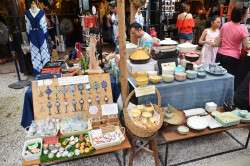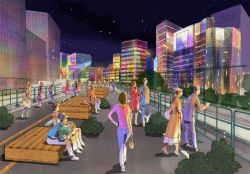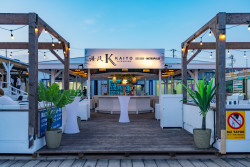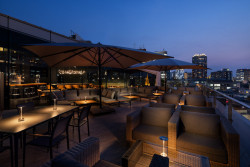
December 2, 2011
“Just Looking Samurai”
Japanese cabbage farmers find their way in the Arab Spring
By Metropolis
Originally published on metropolis.co.jp on December 2011

My connection with Japan does not yet run deep. A few business trips have been basically confined to Tokyo. One Sunday this November, a close friend took me on an excursion into the countryside to Lake Kawaguchi. We went to see the changing leaves, to take in looming Mt. Fuji, and, improbably, to visit a cabbage farm. His mother, who speaks English, had a relationship with the family that owned the farm and gave English lessons there twice a month. I was invited to lunch, and was happy to have a chance to be welcomed to a traditional country home.
It might seem strange that cabbage farmers would want to learn English. It was explained to me that after the growing season, the winters were long and lazy. There was evidence of those long winters throughout the house, in the karaoke machine and performance stage, and in the various rooms for entertaining. Furthermore, the cabbage farmers had managed to travel the world in their down-season. The most recent, a January trip to Egypt, happened to coincide with the beginning of the Egyptian revolution.
“Yes,” I was told, “on the last few days of the trip, the rebellion started.” They found themselves stranded at the airport with other foreign nationals looking for a way out. The Japanese Embassy distributed food to their tour group, but it wasn’t much. Suddenly refugees, they ended up sleeping on the cold concrete floor.
In the airport, I gathered that a special relationship of give-and-take developed between the Egyptian shopkeepers and the Japanese. The shopkeepers already had a name for the Japanese tourists, a phrase that jumbled together perhaps the only word in Japanese that is universally known (samurai) with an expression the Egyptians appropriated from the tourists themselves, who said, “miteru dake,” or “just looking” whenever they entered a shop, probably put off by the more aggressive sales style of some of the Arab shopkeepers. “Miteru Dake Samurai,” or “Just-Looking Samurai,” the Japanese were called. The shopkeepers had unknowingly found the perfect name for the cabbage farmer and her tour group. Brave Japanese venturing out into the world, if not to conquer, then to look, to see, to learn, and, just possibly, to buy a little something to remember.
On this trip, the cabbage farmers left something behind in Egypt. Sleeping on the cold floor was rather uncomfortable. Naturally, the man of the house was used to fixing things and making furniture in their house and farm. He noticed that the shopkeepers were throwing away cardboard boxes. So he used his knife to cut joints and slots in the boxes, until he had fashioned a kind of cardboard house that kept him and his wife off the cold floor and gave them a degree of privacy. People in the Japanese tour group requested his help to do the same, and before long, other people around the airport were coming to see the cardboard box houses and find out if they could get one. By the time the cabbage farmers found a flight out of Egypt, the Egyptian shopkeepers were selling cardboard box houses for $5 each.
After she told me the story, I asked her to translate my admiration to my hostess. We finished our lunch and toured the lake. It was fall. The water was a brilliant blue and the trees were vibrant red. Mt. Fuji was hidden in the clouds. In the late afternoon we caught a bus back to Shinjuku. The bus hit traffic going into the city, and I had time to think about the cabbage farmer’s story.
The Egyptian entrepreneurs had been ready to adapt a new idea and turn it into economic opportunity. The Japanese innovator had made something new as a natural expression of himself and his culture. Both parties had been essential and intertwined in the episode, yet with individual motives that had never needed to align. To be sure, the cabbage farmer had not started cutting cardboard with any great cry of “Eureka!” or with the idea of creating a new product, or even with sense at all that he might make an impact on the airport’s multinational microcosm. The problem was cold hard floors. The solution he found was reminiscent of rice-paper walls, and before long, the whole little world had taken notice.
Have something to say about this story? Share your comments below.







